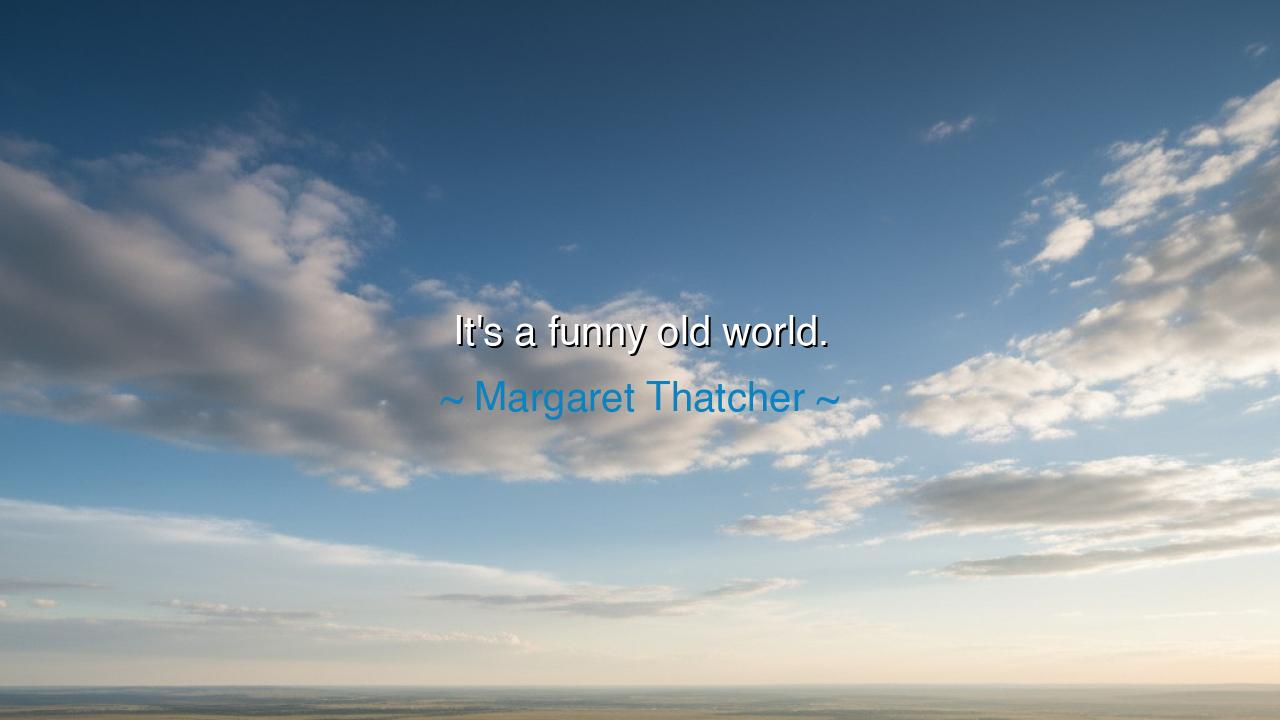
It's a funny old world.






“It’s a funny old world.” Thus spoke Margaret Thatcher, the Iron Lady, as she stepped down from the throne of power she had held for over a decade. These words, simple yet profound, were her final reflection after years of triumph and turmoil — a summation of the strange, unpredictable nature of human life and history. In them lies not the laughter of comedy, but the wistful smile of understanding — the recognition that fate often moves in paradox, that the same world which lifts us up will one day humble us, and that power, glory, and sorrow are but alternating tides in the great sea of existence.
When Thatcher said, “It’s a funny old world,” she was not mocking life, but marveling at its irony. Here was a woman who had stood unshaken through wars, strikes, and storms of politics, a figure of relentless will — and yet, in the moment of farewell, her words carried gentleness, even wonder. The phrase reflects an ancient wisdom: that life is not a straight road but a winding path, filled with reversals, contradictions, and surprises. What we call “funny” here is not humor, but irony — the strange symmetry of fortune that can turn victory into loss, and sorrow into wisdom. The old philosophers would have called it the dance of Fate, the unseen rhythm that moves men and nations alike.
The ancients knew this truth well. The Greeks told of Fortuna, the goddess who spun her wheel without pity or preference. Kings could rise to power in the morning and fall by dusk, not through weakness, but because the world itself is woven with impermanence. The Stoics taught that to live well is not to escape this change, but to accept it with grace — to meet both triumph and ruin with the same calm heart. And so, when Thatcher, after eleven years as Prime Minister, found herself dethroned by her own allies, she did not rage against the world; instead, she smiled, and said, “It’s a funny old world.” In that small moment of humility, she joined the company of those who have learned the hardest of lessons: that even the mighty must bow to time.
There is, too, a tone of resilience in her words. To call life “funny” is to refuse despair. It is to look upon betrayal, struggle, or failure and still find perspective, even grace. Many who suffer curse their fate, but the wise, like Thatcher, learn to laugh softly at it. For laughter — even quiet laughter — is the sound of freedom. It is the soul’s refusal to be crushed by absurdity. To say “It’s a funny old world” is to say: I see the madness, the cruelty, the beauty, and the change, and yet I remain unbroken. That is the true strength of the spirit.
Consider the story of Abraham Lincoln, who, in his years of sorrow and burden, often turned to humor not to escape reality, but to endure it. His presidency was marked by war and grief, yet he once said, “If I did not laugh, I should die.” In that laughter, as in Thatcher’s final words, there is wisdom — the recognition that life’s contradictions cannot always be understood, only accepted. Both Lincoln and Thatcher, though separated by centuries and continents, grasped the same truth: that life’s greatness lies in its unpredictability, and that endurance requires not only strength but a touch of humor toward fate.
The origin of Thatcher’s quote lies in her resignation speech of 1990, when the storm of politics that had long obeyed her will finally turned against her. It was a moment that revealed her humanity — a woman who had led a nation through transformation now bowing to the inescapable law of change. “It’s a funny old world,” she said, not in bitterness, but in awe. For she had seen it all: the rise and the fall, the cheers and the jeers, the fleeting loyalty of men, and the unending march of time. The phrase was both farewell and philosophy — an acknowledgment that in the grand theater of history, no one remains forever on stage.
From her words, we may draw a lesson for our own lives: accept the irony of existence. When fortune shifts, when the world turns its back, remember that it is the nature of life to change. Meet both praise and blame with balance. When the world confounds you, smile — not in ignorance, but in wisdom. For the ability to see life’s contradictions and still find beauty within them is the mark of the mature soul. Learn to laugh gently at fate’s games, and you will never be its captive.
So, my friend, when your own world surprises you — when plans collapse, when victories fade, when endings come unexpectedly — remember the words of the Iron Lady: “It’s a funny old world.” Say them softly, not in defeat, but in understanding. For to see the humor in life’s tragedy is to transcend it. It is to stand, as Thatcher did, at the edge of power and loss, and still find wonder in the mystery of it all. For truly, life is a funny old world — not because it mocks us, but because it humbles us, and teaches us, again and again, how to be human.






AAdministratorAdministrator
Welcome, honored guests. Please leave a comment, we will respond soon